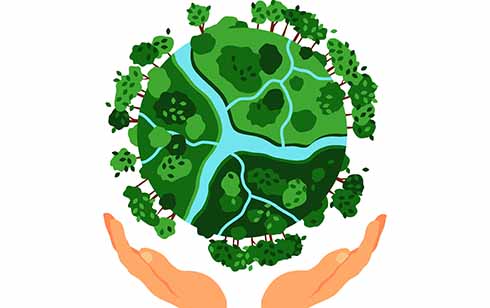 It might seem a little sentimental to refer to the earth as our mother. Yet the description goes back a long way. In the ancient world the world was often seen as mother and as wet nurse. The metaphors suggest that our relationship to the world is personal and expresses reliance on it.
It might seem a little sentimental to refer to the earth as our mother. Yet the description goes back a long way. In the ancient world the world was often seen as mother and as wet nurse. The metaphors suggest that our relationship to the world is personal and expresses reliance on it.
The world is not simply a thing that is at our disposal. Nor is it something for which we need have no feeling, something on which we do not depend.
When people imagine our relationship with our world today, they don’t usually see it as personal. We more often see it as something that we can dig, burn, clear, poison, sow, fertilise and change in any ways that meet our needs and our desires. We see it as a mine, a field, an empty site to be occupied, a possession to be defended.
One-sided relationship
If we see the relationship in this way, it is one-sided. We are active and the world is passive. We make decisions on how we shall use it and it does not complain. We are the masters who own it, decide how to treat it and make profits from it, and it is our uncomplaining slave. We are persons, and it is our food bowl, our meat supply, our water tank, our emissions producer and our rubbish tip. If it misbehaves by catching fire, infecting us or our crops, we burn it, bulldoze it, dose it with pesticides and declare war on it. It is there for us to treat as we wish.
Until, of course, it is not. The reality of climate change has told us that the world is not a mine, not our slave. That what we do to one part of it will have consequences for other parts of it. If we burn coal and oil in one place, it will affect other places, assisting the temperature of the earth to rise, rainfall to be more unpredictable, droughts to increase, forests to burn more easily, water temperatures to rise coasts to be eroded, and to damage the quality of life for many human beings, especially the poor.
Interconnectedness of our world
The coronavirus also reminds us how we ourselves, our plans, our cities, transport and our livelihood can be paralysed by one of the tiniest beings in our world. If we rampage around our world like Goliath, we can be undone by our fellow creatures that we cannot even see.
In fact, our relationships to the world are two-sided. We are part of the world. What we do to one part of it affects other parts, including ourselves. Our relationships to the world are personal. The images of the world and as wet nurse suggest this. The earth has its rhythms and timetables that we must respect because we are part of them. It needs to be understood as we need to be understood as part of it.
To recognise that we need to take time to look around us and to change the way we walk in the world. That has been the focus of the Jesuit Social Services programs, especially the Outdoor Experience that allows young people to enter the world of nature and to learn about it.
To consider the world as our mother pays attention to the rich and delicate relationships that form the rhythms of a flourishing world. When we stop before the wonder of our world we are led to ask how we can respect it.